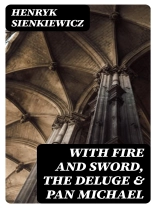Henryk Sienkiewicz’s ‘With Fire and Sword, The Deluge & Pan Michael’ presents a masterful narrative that encapsulates the tumultuous history of Poland during the 17th century. This epic trilogy intertwines themes of heroism, nationalism, and sacrifice, illustrating the struggles faced by the Polish nobility amid the backdrop of war and political upheaval. Sienkiewicz’s literary style, rich in vivid descriptions and emotional depth, serves to immerse readers in a period marked by invasions and alliances, while also showcasing the resilience of the human spirit. The work is not just a historical account; it is imbued with a sense of romanticism that reflects Poland’s yearning for independence and unity during the partitions of Polish territories. Sienkiewicz, awarded the Nobel Prize in Literature in 1905, was profoundly impacted by his Polish heritage and the sociopolitical landscape of his time. His extensive travels and deep understanding of Polish history informed his narrative techniques and character development, allowing him to bring to life the valor and tribulations of his countrymen. His passion for history and culture, combined with his experiences of oppression, spurred him to pen this trilogy as both a tribute to Poland and a means of rallying the national spirit. I highly recommend ‘With Fire and Sword, The Deluge & Pan Michael’ to readers who seek not only an engaging narrative but also an insight into the cultural and historical aspects of Poland. Sienkiewicz’s work resonates with anyone interested in themes of bravery, love, and loyalty against the backdrop of adversity. It is a compelling exploration of identity and heritage that leaves an indelible mark on the reader’s conscience.
Mengenai Pengarang
Henryk Sienkiewicz (1846–1916) was a titan of Polish literature, whose soaring narratives have captivated readers with their vivid portrayal of Poland’s history. Born in Wola Okrzejska, Sienkiewicz is perhaps best known for his epic historical novels, especially the Trilogy, which comprises ‘With Fire and Sword’ (1884), ‘The Deluge’ (1886), and ‘Pan Michael’ (1887-1888). These works not only exemplify Sienkiewicz’s literary prowess but also reflect his deep patriotism and longing for Poland’s independence, which at the time was partitioned by neighboring powers. Sienkiewicz’s writings are characterized by their rich historical detail, sweeping plots, and the author’s capacity to intertwine personal drama with grand historical events. His skill as a storyteller earned him global recognition, ultimately receiving the Nobel Prize in Literature in 1905 ‘because of his outstanding merits as an epic writer.’ His other notable works include ‘Quo Vadis’ (1896), a historical novel set in ancient Rome that further cemented Sienkiewicz’s reputation as a master of the historical genre. Scholarly discussions of Sienkiewicz’s style often comment on his romanticized vision of the past, his flair for dramatic narrative, and his ability to create characters that have become embedded in the cultural consciousness of Poland and the wider world. His works remain a testament to the enduring power of storytelling in shaping national identity and preserving collective memory.












